FIDE World Cup 2025 to be hosted in India

The FIDE World Cup is coming to India this year! Scheduled for October 30 to November 27, 2025, the tournament will feature the world’s best players battling for the coveted title and qualification spots in the 2026 FIDE Candidates Tournament. Format The FIDE World Cup 2025 will feature 206 players competing in a knockout format—a dynamic and unpredictable system where the losing player in each round is eliminated. The event has used several formats over the years, but since 2021, it has followed a single-elimination format. Each round spans three days: two classical games on the first two days, followed by tie-breaks on the third day, if necessary. In the first round, the top 50 players receive byes, while players seeded from 51 to 206 compete, with pairings based on the principle of the top half versus the reversed lower half. What’s at stake? The top three finishers of the 2025 World Cup will earn direct qualification for the 2026 Candidates Tournament, which determines the challenger for the World Chess Championship. Qualification Paths Players can qualify for the World Cup through various avenues, including: Reigning World Champion as of June 1, 2025 Top four finishers from the FIDE World Cup 2023 Reigning Women’s World Champion as of June 1, 2025 2024 World Junior Champion U-20 Spots Africa Americas Asia Europe Granted 3 3 3 3 Top 8 juniors 0 0 6 2 Top 60 players 0 9 26 25 Total 3 12 35 30 Qualifiers from Continental events, accounting for 80 spots The highest-rated players in the June 2025 FIDE standard rating list, 13 players, who have not qualified by any of the above listed path Top 100 national federations from the 2024 Chess Olympiad open section, each receiving one spot 4 nominees of the FIDE President 2 nominees of the Organiser Detailed information on qualification can be found in the official FIDE handbook. India: A chess powerhouse This year’s World Cup being held in India is particularly exciting. India has become a dominant force in the chess world, thanks in part to five-time World Champion and FIDE Deputy President Viswanathan Anand, whose efforts and legacy have been instrumental in popularizing chess in the country. India’s young stars include Gukesh Dommaraju, who became the youngest FIDE World Chess Champion at 18, Praggnanandhaa R, the runner-up of the 2023 World Cup, and Arjun Erigaisi, currently ranked world number five. In 2024, both the Indian Open and Women’s teams claimed their first-ever gold medals at the Chess Olympiad—a historic achievement further highlighted by four individual gold medals won by Gukesh, Erigaisi, Deshmukh, and Agrawal. Additionally, Koneru Humpy secured gold at the 2024 FIDE Women’s Rapid Championship, and Vaishali Rameshbabu earned bronze at the 2024 FIDE Women’s Blitz Championship. Photo: Stev Bonhage India has also recently hosted major events, including the FIDE Chess Olympiad 2022, Tata Steel Chess India, the FIDE World Junior U20 Championships 2024, and the 5th leg of the FIDE Women’s Grand Prix (April 2025). These accomplishments underscore India’s status as a global chess hub, making it a fitting venue for the FIDE World Cup 2025. FIDE CEO Emil Sutovsky expressed his excitement: “We are thrilled to bring the FIDE World Cup 2025 to India, a country with a deep-rooted passion and support for chess. Indian chess fans’ enthusiasm has always been remarkable, and we anticipate great interest in the event among local chess lovers, both on-site and online. To enhance the experience, FIDE is committed to organizing numerous side events, featuring tournament participants and chess legends.” Further details, including the announcement of the host city, will be released in due course. FIDE looks forward to an exhilarating tournament that continues to celebrate and advance the game of chess worldwide. The list of qualified players: https://worldcup2025.fide.com/participants/
FIDE Council Meeting held online on July 18, 2025

The second FIDE Council Meeting of 2025 took place on July 18, alongside the ongoing FIDE Women’s World Cup. Held in an online format, the meeting addressed a range of important topics, including development projects, budget matters, the FIDE calendar, fair-play measures, and the approval of new player titles. New Grandmasters approved One of the key highlights of the meeting was the approval of 10 new Grandmasters. Among them is 21-year-old Bibisara Assaubayeva of Kazakhstan, who becomes the second Kazakhstani woman and the 43rd female player in history to earn the prestigious GM title. The full list of newly approved Grandmasters: * Bibisara Assaubayeva (KAZ, 13708694)* Leonardo Costa (GER, 16213955)* Julian Kramer (GER, 12921742)* Edgar Mamedov (KAZ, 13739980)* Christopher Noe (GER, 24692018)* Tao Pang (CHN, 8609950)* L R Srihari (IND, 46617116)* Milosz Szpar (POL, 1184989)* Artem Uskov (FID, 34254854)* Matthew J. Wadsworth (ENG, 415804) Key event dates confirmed The Council confirmed the dates for several major upcoming events on the FIDE calendar: * FIDE World Cup 2025 – October–November 2025, India* Women’s World Team Championship 2025 – November 2025, Linares, Spain* 2nd FIDE Chess Olympiad for People with Disabilities – October 2025, Kazakhstan Participation of neutral team at Women’s World Team Championship In line with FIDE’s policy of following IOC guidance and in accordance with practices adopted by several international sports federations — such as World Aquatics, the International Fencing Federation, and the International Gymnastics Federation — the Council approved the participation of a team of athletes of Russian nationality in the 2025 Women’s World Team Championship under the FIDE flag, subject to obtaining a non-objection letter from the IOC. This decision builds upon the precedent set by the January 2025 FIDE resolution, which allowed neutral teams of vulnerable groups (youth and players with disabilities) to participate in team competitions. All such entries are required to compete without national symbols, in full alignment with IOC policy. A complete list of decisions from the FIDE Council Meeting will be published in due course.
20th ICCD World Team Championships: Registration now open
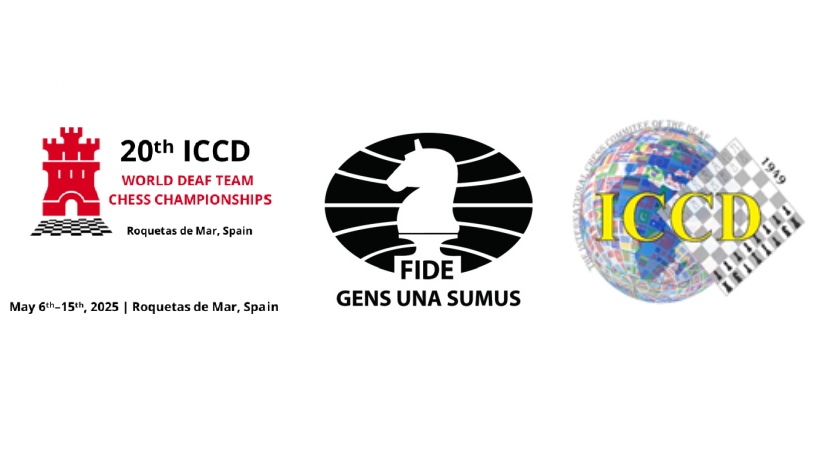
The International Chess Committee of Deaf (ICCD) invites all ICCD member countries to participate in the 20th ICCD World Team Chess Championships. The event will be held in Roquetas de Mar, Spain from May 6-15, 2026 and include six competitions: 20th ICCD World Deaf Team Chess Championship 1st World Deaf Team Blitz Chess Championship 1st World Deaf Team Rapid Chess Championship 8th World Deaf Individual Blitz Chess Championship 14th ICCD Deaf Open Individual Chess Tournament 1st ICCD Open Individual Rapid Chess Tournament The ICCD encourages visually-impaired deaf chess players to participate in any of these events. Please complete and send FORM 1 to the ICCD Secretary General at iccd.gensecretary@gmail.com and the Organizing Committee: alfredogomez@iccdroquetasdemar.com Registration deadline (for submitting FORM 1): October 14, 2025 Participation in this ICCD World Deaf Chess Championship implies full acceptance of the present regulations. The ICCD Organizing Committee reserves the right to modify, replace or cancel any of the clauses or conditions set forth herein, as well as to make changes to the schedule, timetable, format or venue of the event should force majeure, justified organizational reasons or unforeseen circumstances arise. Any modifications will be officially communicated through the designated communication channels of the organization. 20th ICCD World Team Championships: Regulations, schedule, format (PDF)
FIDE Women’s World Cup Round 5 Game 2: Lei Tingjie, Tan Zhongyi and Humpy Koneru qualify for the semifinals
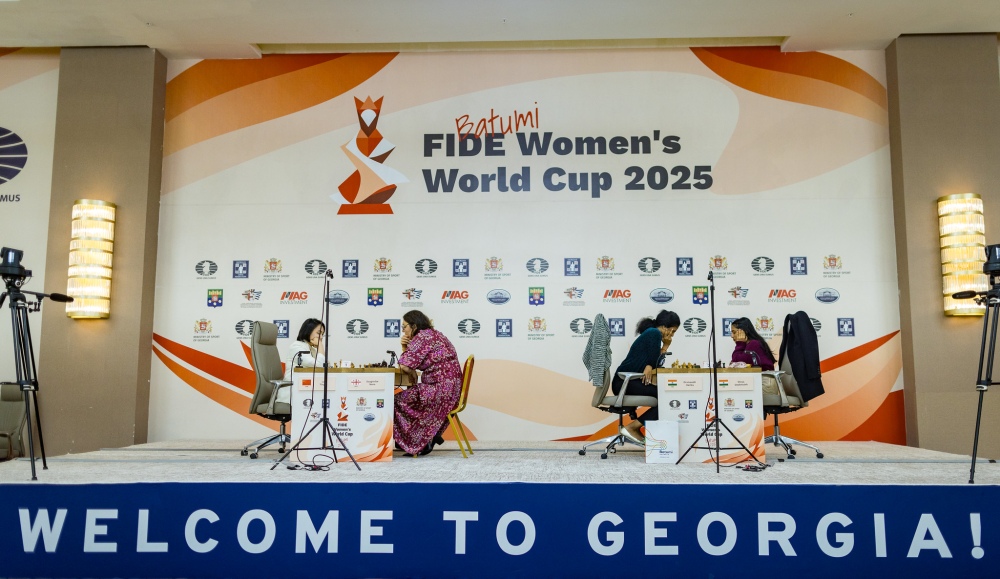
Harika Dronavalli and Divya Deshmukh will tiebreak tomorrow for the fourth spot International Chess Day was celebrated in grand fashion across the globe. At the Grand Bellagio, the festivities began with a magnificent celebratory cake prepared by the hotel’s chef. The cake was ceremonially cut by Akaki Iashvili, President of the Georgian Chess Federation, alongside the final eight players of the World Cup—a fitting start to a day dedicated to the game. The second games of the fifth round delivered thrilling action. All four matches were fiercely contested and went the full distance, culminating in two decisive victories and two hard-fought draws. As a result of today’s games, Lei Tingjie, Tan Zhongyi, and Humpy Koneru have secured their spots in the semi-finals. Harika Dronavalli and Divya Deshmukh will return tomorrow for the tiebreak match to determine the fourth semi-finalist. The day was a true celebration of chess—marked by tradition, talent, and tenacity on the board. Let’s take a closer look at the games IM Song Yuxin – GM Humpy Koneru (0.5-0.5) Having to win with White to level the match, Song Yuxin essayed the tricky Jobava London system. Humpy, however, wasn’t caught off guard—she had clearly prepared for the line and emerged from the opening with a comfortable position. On move 14, Humpy spent nearly half an hour assessing the validity of a risky and entirely unforced double pawn sacrifice, aimed at gaining significant positional compensation. Her opponent would be left with two sets of weak pawns, including a set of tripled, isolated pawns. Song did her best to improve her pawn structure without returning the extra material, but the position proved too difficult—the risk was simply too great. Eventually, the material balance was restored, and the players agreed to a draw. After the game, Humpy graciously stopped by the media center for an interview with Charlize van Zyl. https://www.youtube.com/watch?v=h6DB3YINRr4 GM Lei Tingjie – GM Nana Dzagnidze (1-0) Needing only a draw to qualify, Lei Tingjie opted for the solid Alapin Variation against Nana Dzagnidze’s Sicilian Defence—a practical and strategic choice to steer the game into quieter waters. Dzagnidze’s response with 8…d5 was slightly imprecise; 8…dxe5 is generally considered the more accurate continuation. As a result, the game transitioned into a middlegame resembling a French pawn structure with a closed center, where Lei held a slight but stable edge. Facing a must-win situation, Dzagnidze took on significant risk with the aggressive 15…g5—a double-edged move that ultimately backfired. Lei responded with composure, gradually building pressure on both flanks. Her bishop pair proved especially powerful, dominating the long diagonals and exposing weaknesses in Black’s position. As the game progressed into the endgame, Lei maintained control. However, on move 49, she played Kh2, missing the more precise 49.Kf1, which would have restricted Black’s defensive resources more effectively. The engine suggests this would have forced Dzagnidze’s hand and sealed the result more cleanly, but the oversight didn’t change the final outcome. Position of the day In a tense endgame, Dzagnidze faltered under time pressure with 53…Nc6?, a misstep that allowed Lei 54.Kg3, centralizing the king and initiating a decisive pawn advance on the kingside. The correct defensive try was 53…Nc5!, immediately targeting the b3 pawn and maintaining practical drawing chances. For example: After 54.g5 Naxb3 55.g6 Nd4 56.Bd1 Nf5, Black holds. Or 54.Bxc5 Kxc5 55.g5 Kd4 56.g6 Nc6, and then 57…Ne7 secures the draw. While Dzagnidze was in a must-win situation, a draw would still have been a creditable save given the pressure. Ultimately, her position was precarious, and the error sealed her fate. Lei took full control, wrapping it up with surgical precision. Her play throughout was strategically sound and psychologically sharp—neutralizing Dzagnidze’s initiative, exploiting structural weaknesses, and converting her advantage smoothly. With this win, Lei advanced straight to the semi-finals without needing tiebreaks. After her fair-play check, Lei joined IM Michael Rahal to review the key turning points and to preview her next challenge: a semi-final clash with Humpy Koneru. https://www.youtube.com/watch?v=zHy17KWA6NY GM Harika Dronavalli – IM Divya Deshmukh (0.5-0.5) This afternoon’s game proved to be the most evenly matched of the four quarterfinals, reaching an astonishing 99% accuracy score — a testament to the high quality and balance of play between the two Indian contenders. In what was undoubtedly one of the most important games of her career, Divya opted for the Neo-Grünfeld Defense with the Black pieces. Harika responded ambitiously, sacrificing a pawn for central control and dynamic piece play — a strategy inspired by none other than GM Ding Liren. However, Divya showed impressive composure and understanding, returning the pawn at the right moment to liquidate into a comfortable and equal endgame. Despite the equilibrium, it was Harika who needed to tread carefully in the final phase. She demonstrated precise endgame technique to neutralize any chances for Black, successfully defending a Philidor position in a rook endgame. With the classical portion ending in a draw, the two will return tomorrow for the tiebreaker — with a coveted spot in the semi-finals at stake. GM Tan Zhongyi – GM Vaishali Rameshbabu (1-0) Former Women’s World Champion Tan Zhongyi continues to demonstrate remarkable consistency at the highest level. She is the only player to have reached the semi-finals in all three Women’s World Cups to date: Sochi 2021 (third place) and Baku 2023 (fourth place). With her victory over R. Vaishali this afternoon, Tan has once again punched her ticket to the final four — this time in the 2025 edition — and will face either Divya Deshmukh or Harika Dronavalli for a spot in the final. It’s a refreshing change of matchup, as Tan had faced Anna Muzychuk in both her previous semi-final appearances. Vaishali played extraordinarily well for most of the game, skillfully holding off Tan Zhongyi’s initiative. However, the Indian GM eventually faltered — perhaps due to fatigue from her recent grueling tiebreaks, while Tan had not yet played a single one in the tournament. The critical moment came after 50.Ke4, where Vaishali missed a crucial drawing resource.
FIDE Women’s World Cup Quarterfinals Game 1: Lei and Humpy strike the first blow
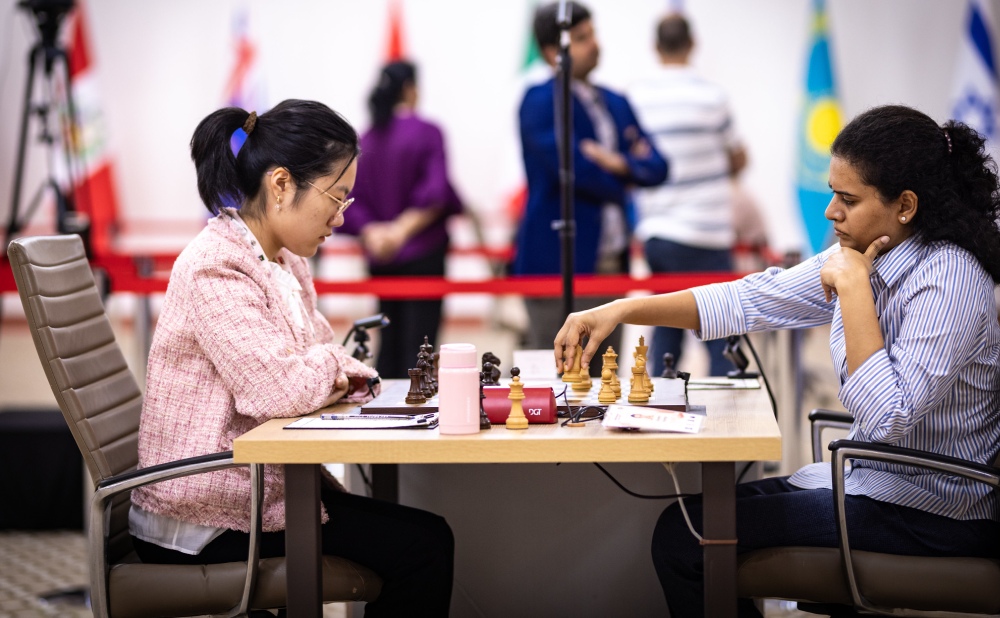
Top seed GM Lei Tingjie made a strong bid for a place in the semi-finals of the World Cup by winning the first game of her quarterfinal match against GM Nana Dzagnidze. The game ended dramatically when Dzagnidze overstepped the time limit. Despite the victory, Lei was candid in her post-game reflections: “I think today I played quite horribly, but the position was quite complicated. I spent a lot of time thinking, while my opponent developed her pieces very quickly.” With this win, Lei Tingjie now needs only a draw in the second game to secure her place in the final four. One of the other favourites to win the Cup, India’s top Grandmaster Humpy Koneru, pulled ahead in her two-game match against IM Song Yuxin. “It was a very complex game,” Humpy said afterward. “I wasn’t too sure about playing this position because she seemed very well-prepared, but I decided to take the risk anyway.” The other two games of the round ended in draws. The four encounters tomorrow will ultimately decide who advances in the World Cup and secures one of the three coveted spots in the Candidates Tournament—the next step toward the World Championship. Let’s take a closer look at the games: GM Humpy Koneru – IM Song Yuxin (1-0) Fully recovered after her grueling tiebreak victory over former Women’s World Champion Alexandra Kosteniuk, Indian GM Koneru Humpy struck first in her quarterfinal match against surprise contender IM Song Yuxin. In the opening, Song demonstrated excellent home preparation, blitzing out her moves with confidence. Humpy, on the other hand, took a more measured approach. On move thirteen, she introduced the new idea 13.e4, a move she found over the board. This appeared to be an improvement over a line previously seen in Vidit–Aronian, and it immediately took Song out of her preparation. By move seventeen, Humpy boldly sacrificed a pawn in exchange for active piece play. Song accepted the challenge, but within a few moves, she found herself under significant pressure. Humpy’s initiative grew rapidly, and by the time the dust settled, Song was already on the defensive — as clearly illustrated in the following diagram. White was an exchange up for a pawn, but both the rook on f5 and the knight on f3 were under attack. In this tense moment, Humpy opted for simplification with 23.Rxf6?!, returning the exchange while maintaining a slight advantage. However, the powerful tactical shot 23.Qf5! would have been decisive. After 23…Nxe6, White could continue with 24.Qxe6+ Kh8, and then the brilliant 25.Ng5! would have left Black in a hopeless position: If 25…Bxg5, then 26.Bxb7 threatens mate on e8, which cannot be stopped. If 25…Bxg2, then 26.Nf7+ Kg8 27.Nd8+, once again leading to a forced mate on e8. Though Humpy missed this crushing continuation, she continued to press her initiative and ultimately converted her advantage into a full point with confident play. After the game, she joined IM Michael Rahal, FIDE Press Officer for the World Cup, in the media center to share her thoughts on the first game. https://youtu.be/C7BM6EpILJs GM Nana Dzagnidze – GM Lei Tingjie (0-1) World Cup top seed Lei Tingjie continued her impressive run in the tournament with another victory, this time against Georgian Grandmaster Nana Dzagnidze. Despite not being at her best, Lei managed to navigate a tense and error-prone game to emerge victorious in dramatic fashion. Dzagnidze, the last remaining Georgian player in the tournament, had the White pieces and opted for the Reti Opening — a popular flank strategy. Lei responded classically, quickly staking her claim in the centre with pawns. The game soon left known theoretical paths, transitioning into a complex “hanging pawns” structure, setting the stage for a deeply strategic battle. Both players spent considerable time navigating the intricacies of the position, exchanging strong moves with occasional inaccuracies. For much of the game, Dzagnidze held the upper hand. However, as she approached time trouble, mistakes began to creep in, and the balance started to shift. In a surprising twist, Dzagnidze overstepped the time control, handing Lei the win. “At the end of the game, both of us had made a mistake on the scoresheets and we both thought we had reached move forty, although in reality we were at move thirty-nine,” Lei explained afterward. “It was a dramatic ending, and I feel sorry for her, but the final position is completely winning for me.” Despite the unexpected conclusion, Lei’s resilience and tactical awareness saw her through. With this win, Lei Tingjie moves one step closer to the title, proving once again why she is the tournament’s top seed. After the game, she joined Charlize van Zyl in the interview area to share her reflections on the match. https://www.youtube.com/watch?v=6wGfKYnp7eY IM Divya Deshmukh – GM Harika Dronavalli (0.5-0.5) When two players perform at 99%, a draw is often the only realistic outcome. Harika chose the ultra-solid Berlin Defence against Divya’s Ruy Lopez, where Divya opted for a lesser-known side-line favoured by Spanish GM David Antón Guijarro. After the opening, Divya appeared to hold a slight edge—thanks to open central files and better piece coordination—but the engine’s evaluation indicated only a minimal advantage. Harika responded well by trading off-key pieces and smoothly liquidating into an equal rook and minor piece endgame. The players agreed to a draw on move 31, a result that arguably favours Harika, who will enjoy the White pieces in the second game of the match. GM Vaishali Rameshbabu – GM Tan Zhongyi (0.5-0.5) The longest game of the afternoon saw a critical moment early on when Vaishali missed the chance to consolidate an extra pawn. The move 22.Qe2, played instead of the more promising 22.Ra3, allowed Tan Zhongyi to seize the initiative. As the game transitioned into the endgame, the Chinese Grandmaster successfully won the exchange for a pawn and pressed hard to convert her advantage into a full point. However, Vaishali defended with precision and resilience, ultimately securing a well-earned draw after seventy-three moves. Follow the games live and
FIDE World U9-U17 Rapid and Blitz Championships 2025: Registration now open
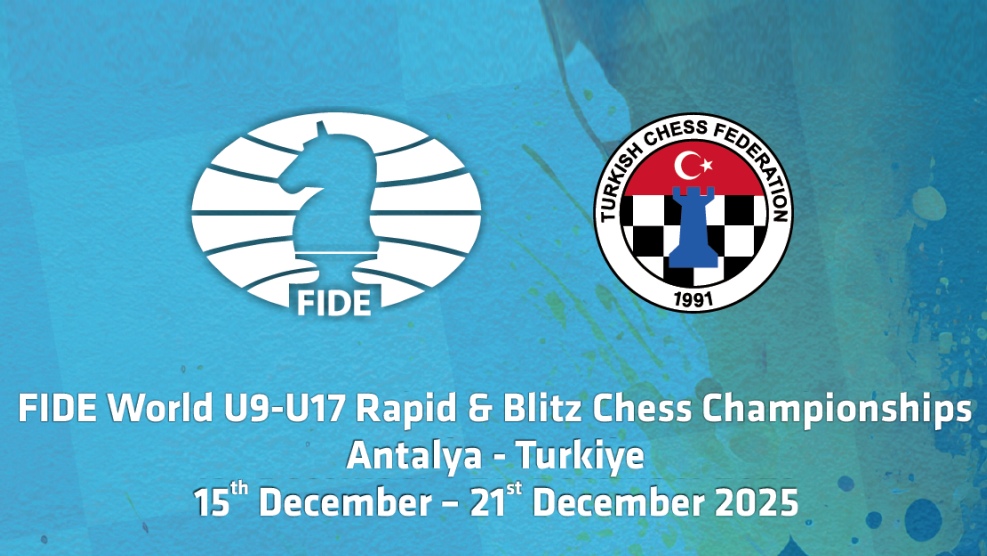
The International Chess Federation (FIDE) and the Turkish Chess Federation are pleased to announce the FIDE World U9-U17 Rapid & Blitz Championships 2025. The event will take place in Antalya, Türkiye, from 15 December (arrival) to 21 December (departure) 2025. There will be five age categories: under 9, under 11, under 13, under 15 and under 17 with separate open and girl’s events. Players placed 1st–3rd at the FIDE World School Rapid and Blitz Chess Championships 2024 are granted the personal right to participate in the corresponding (or higher) age category, provided they meet the age requirement as of 1 January 2025. FIDE member Federations should register their participants and may enter an unlimited number of players. The registration deadline: October 15, 2025 E-mail: youthrapidblitz@fide.com Invitation letter (PDF)
ChessFests across England this summer

ChessFest Trafalgar Square A huge thank you to everyone who came to Trafalgar Square on Sunday for ChessFest 2025. Over 20,000 visitors enjoyed a range of fun, family-friendly chess activities: Our troupe of actors put on four fabulous performances, re-enacting the famous Evergreen Game. Some of England’s top chess stars (Nikita Vitiugov, Mickey Adams, et al) took on all-comers in simultaneous games. Many thousands of blitz games were played in our Challenge the Master tent. England junior stars Bodhana Sivanandan and Supratit Banerjee defeated their counterparts from North America in a live match. Grandmasters Gawain Jones and Matthew Sadler delivered an amazing queen sacrifice to win a blindfold consultation game. CSC tutors delivered hundreds of free lessons to players of all standards in one of two teaching tents. A game of giant blitz chess between two masters turned out to be as much a test of physical speed and stamina as chess ability. FunMaster Mike and his team entertained all the ChessKids with two Puzzle Rush competitions. ChessFest Portishead New for 2025, ChessFest opened in the Somerset coastal town of Portishead on Saturday 12th July. ChessFest truly took over the whole town for the day: Zone 1 – Casual Chess at Aqua. Visitors enjoyed a game of chess with brunch and coffee in this great restaurant on Portishead Marina. The chess was still carrying on 3 hours after ChessFest had finished! Zone 2 – Elite Chess on Parish Wharf. International Master Chris Beaumont took on four players simultaneously while blindfolded! Zone 3 – Kids’ Zone outside Portishead Leisure Centre. ChessKid’s FunMaster Mike who ran activities for children of all ages. Zone 4 – Schools’ Competition at Portishead Primary School (9am-11am). Children from across the town took part in an outdoor tournament. Zone 5 – Ark of Angels in Jubilee Park. 32 adults and children took the place of chess pieces in two live performances. Special thanks go to the CSC Bristol team for an amazing inaugural event. We know they are already planning for next year! Still to come… ChessFest Liverpool ChessFest returns to Chavasse Park at Liverpool One for a fifth year on Sunday 20th July. Please join the event for: Free chess lessons for adults and children, delivered by CSC tutors Social games of chess on one of many boards across the park Giant chess games – a test of skill and stamina Simultaneous displays – take on a one of our visiting chess masters Blitz chess tournament – test your skills at speed chess Last year, over 1,000 people enjoyed a day of free, family-friendly fun at ChessFest Liverpool. We hope to see you there. Government announces funding for chess Just as our Trafalgar Square event was coming to a close, one of CSC’s highest profile ambassadors, Chancellor of the Exchequer Rachel Reeves was announcing a huge boost to English chess: a £1,500,000 financial package aimed at “identifying, supporting, and elevating young people who have the potential to compete at the top level“. The Chancellor, herself a junior chess champion, is a regular attendee at our events, and recently came to see a school from her Leeds West constituency take part in a CSC tournament in London, taking on eight of the players simultaneously while she was there. This funding builds on a series of grants introduced under the previous government. On this week’s funding, Rishi Sunak commented, “Chess isn’t just a great game. It also builds the kind of skills young people need to thrive in an increasingly complex and competitive world.”We await more details of the new grants. Under the previous funding, 100 schools introduced chess lessons and chess clubs for their pupils, with 42 of these being delivered via CSC’s Schools Programme.
FIDE Women’s World Cup Round 4 Tiebreaks: the four Indians push through

Tomorrow’s quarterfinals are set: Lei Tingjie vs Dzagnidze, Humpy vs Song Yuxin, Harika vs Divya and Tan Zhongyi vs Vaishali This afternoon’s tiebreaks proved every bit as exciting as anticipated. Two of the Indian players had already secured their spots in the final eight after the 15/10 rapid games: Women’s World Rapid Champion GM Humpy Koneru and World Junior Champion IM Divya Deshmukh. The other two matches were fiercely contested. GM Harika Dronavalli clinched her place in the final eight by defeating GM Kateryna Lagno in their 98th (!) game—a remarkable display of endurance and skill. Let’s take a closer look at the afternoon’s action: GM Zhu Jiner vs IM Divya Deshmukh (0.5-1.5) In the first 15+10 rapid game, playing with White, Zhu Jiner surprised everyone by opening with the rarely seen Konstantopoulos King’s Knight Opening—an offbeat line I personally had never encountered before! Despite its unorthodox nature, she managed to secure a slight edge heading into the middlegame. However, Divya remained composed throughout. She patiently waited for Zhu to overextend, then launched a precise counterattack. Following a series of trades, the Indian International Master steered the game into a superior rook endgame. While the engine evaluates the position as theoretically drawn with perfect play, it was extremely difficult to defend in practice—especially under time pressure. With excellent technique she converted and pulled ahead in the tiebreak. Between rounds, Divya relaxed with her mother, while she checked some opening files on her laptop. In the second 15+10 rapid game, Zhu Jiner made a bold and insightful decision by sacrificing her queen for a rook and a bishop, aiming to avoid a highly drawish position. This queen sacrifice was not only strategically sound but also demonstrated her deep understanding of the position and willingness to take risks in pursuit of victory. In other circumstances, it might have worked out for her—but Divya is operating on an entirely different level these days. She found the precise sequence to maintain balance on the board, calmly neutralizing the pressure. In fact, the final position offered her real chances to press for a win, but she wisely chose to take the draw and secure her qualification. After the match, Divya shared a warm hug with her mother before heading over to join FIDE’s Charlize van Zyl for a post-game interview. https://youtu.be/Y_xbMFpOVd8 GM Humpy Koneru vs GM Alexandra Kosteniuk (1.5-0.5) In the first game, Kosteniuk equalized comfortably and quickly seized the initiative. Humpy struggled to find her footing and opted for a daring piece sacrifice—a double-edged decision that was an excellent practical choice given the circumstances, aiming to complicate the position. While such a sacrifice would likely have failed in classical time controls, Kosteniuk, pressed for time, was unable to parry all of Humpy’s threats effectively. The second game unfolded more smoothly for the current World Rapid champion. Apart from one specific tactical moment in the opening, Kosteniuk overextended and soon found herself on the defensive. Humpy steadily increased the pressure, eventually reaching a winning endgame. Although the game ultimately ended in a draw, that result was enough to secure Humpy’s place in the final eight. After the game, Humpy kindly joined FIDE Press Officer Michael Rahal in the media centre to analyse her second game. https://youtu.be/5Q060EJt1eo GM Kateryna Lagno vs GM Harika Dronavalli (1.5-2.5) In the first 15/10 rapid game, Harika attempted to surprise her opponent by opting for the rare Ulvestad variation of the Two Knights Defense. However, Lagno was well-prepared and confidently followed the theoretical moves, securing a slight advantage entering the middlegame. From there, she maintained the initiative and kept up the pressure throughout. Although Harika had a few opportunities to force equality, the game ultimately swung in Lagno’s favour. Qualification was in Lagno’s hands in the second game. In this position, Harika blundered huge with 45.Qf3??, attempting to simplify by exchanging queens and convert her extra pawn in the endgame. In fact, that’s more or less what happened! However, Lagno astonishingly missed a winning opportunity. Instead of playing 45…Qe7??, she could have captured the bishop with 45…Rxd5! Now, if 46.Qxd5, then 46…Qxf2 threatens mate with 47…Qh2#, while 46…Nxf6 defends the rook and maintains a decisive advantage. “I saw it as soon as I dropped the queen,” Harika admitted immediately after the match. “But when she didn’t play Rxd5, I knew I still had a chance to make a comeback.” In the third tiebreak, the 10/10 rapid section, Lagno pressed throughout the game, creating a powerful passed d-pawn. At one point, the engine indicated a winning advantage for her, but it was never straightforward. The presence of opposite-coloured bishops meant that even with the extra pawn, victory was far from guaranteed. The fourth and final rapid game was a technical masterpiece. Harika kept up relentless pressure but needed a final blunder from Lagno — an unfortunate queen exchange — to seal the match with a beautifully executed bishop endgame. https://youtu.be/jYhzHNl7CGk IM Meruert Kamalidenova vs GM Vaishali Rameshbabu (3.5-4.5) This match was the longest of the four, ultimately being decided in the blitz games. Both players traded wins in the rapid games, proving that they were more than able to make a comeback from certain elimination. Kamalidenova took the head start in the first game, taking advantage of Vaishali’s weak castled king, while in the second game it was Vaishali who prevailed in a slightly better endgame. The third rapid game was a tactical landslide for Vaishali but Kamalidenova showed her ferocious spirit with a huge comeback in the fourth. Ultimately, the match had to be decided in the blitz games. The first of the two was a 96% accuracy totally equal game, but the second could have gone either way. In her postgame interview, Vaishali was actually very relieved – she realised she could have been going home at a certain point. https://youtu.be/hSlSacTKSCo Follow the games live and watch the action with expert commentary provided by GM Valeriane Gaprindashvili and IM Almira Skripchenko on the FIDE YouTube channel. Written by IM
FIDE Director for Chess Development visits Mauritania

In his ongoing efforts to promote chess growth across Africa, Grandmaster Nigel Short, FIDE Director for Chess Development, recently visited Mauritania. The primary purpose of the visit (from July 8-12) was to strengthen relations with the Mauritanian Chess Federation, the Ministry of Sport, and the National Olympic Committee, as well as to assess the state of chess development in the country. The program included meetings with the Minister of Sport and the Mauritanian National Olympic Committee, where discussions focused on strategies for the future of chess in Mauritania and on reaching an agreement with the Ministry of Education regarding the introduction of chess in schools. As part of his visit, Nigel Short also gave a simultaneous exhibition at the Hotel Nouakchott. The event was attended and formally opened by His Excellency Mr. Guy Harrison, the British Ambassador to Mauritania. Nigel Short was later honored with a trophy by the president of the national federation. He also visited the headquarters of the Mauritanian Chess Federation, where he met with the executive board and top local players to share his chess expertise. The Mauritanian Chess Federation expressed its deep appreciation for Nigel Short’s visit and voiced its hope to collaborate with FIDE on future joint programs.
FIDE Women’s World Cup Round of 16 Day 2: Lei Tingjie, Tan Zhongyi, Nana Dzagnidze and Song Yuxin advance to quarterfinals
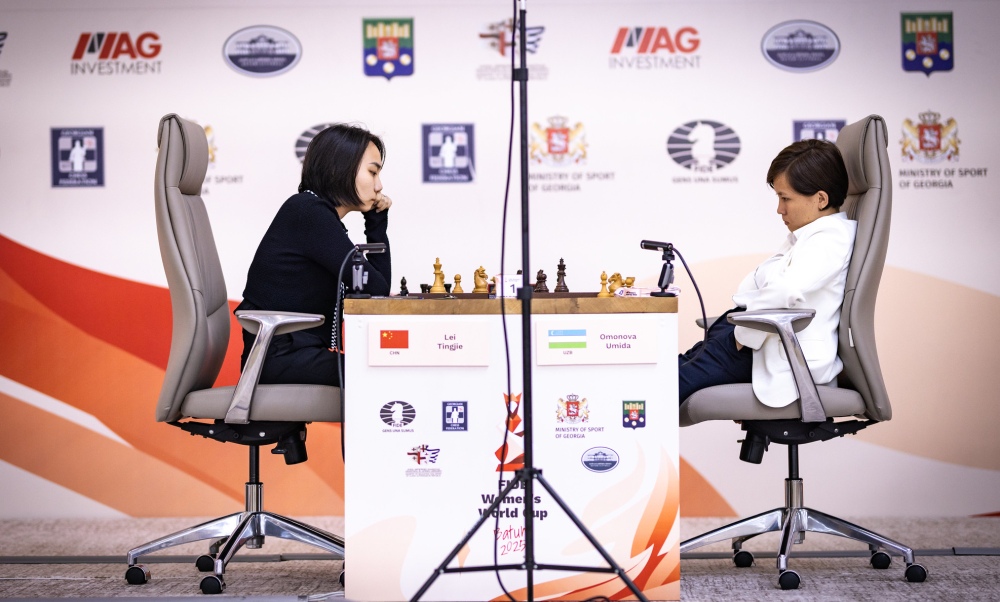
The four Indians head to tiebreaks tomorrow for quarterfinal spots The second game of Round of 16 in the Women’s World Cup knockout stage brought plenty of excitement and high-stakes drama. Of the eight matches played, only two had a decisive result, while six ended in draws—pushing most of the action into tiebreak territory. China’s top seeds, GM Lei Tingjie and GM Tan Zhongyi, continued their dominant run, qualifying directly for the quarterfinals without having played a single tiebreak so far. Joining them are GM Nana Dzagnidze and the tournament’s standout underdog, IM Song Yuxin, who punched her ticket to the final eight. All eyes now turn to the four Indian contenders, who will return tomorrow for what promises to be a thrilling round of tiebreaks. With a major prize increase and a coveted quarterfinal slot at stake, the pressure couldn’t be higher. Let’s take a closer look at how this afternoon’s games unfolded… Needing a win to force a tiebreak, WIM Umida Omonova opened with 1.e4, clearly signaling her intent to fight. GM Lei Tingjie, however, set aside her usual 2…Nc6 repertoire and instead opted for the ultra-solid Petroff Defense—an opening that’s become a hallmark of China’s top players. While Omonova was unable to gain any tangible advantage out of the opening, she remained persistent, pressing throughout the game and staying alert for any slip from her experienced opponent. In the position, 40.Nf5? was indeed a pivotal mistake—especially painful given that Omonova had ample time on the clock. The preferred continuation, 40.f4! Rxb3 41.f5!, would have launched a powerful kingside initiative, tying down her opponent’s pieces and maintaining strong winning chances. Missing this moment cost her not only the advantage but ultimately the game, which ended in a perpetual check — a common escape route in high-stakes matches when one side falters. Despite this, Omonova’s postgame attitude was strikingly mature. Rather than dwell on the missed opportunity, she looked ahead with determination, expressing her focus on upcoming competitions and her long-term goal of becoming World Champion. This mindset is critical at the elite level, where resilience often defines careers more than individual victories or defeats. IM Divya Deshmukh generally plays the Sicilian defence with Black but the open games with 1…e5 have always been considered a safer option when a draw is a good result. GM Zhu Jiner opted for the Mieses variation of the Vienna Game, a subtle and less mainstream attempt to sidestep heavy theory and provoke imbalances in quieter waters. Zhu had only played this line twice before (in 2018), suggesting this was a prepared surprise weapon. The choice may have been strategic, targeting Divya’s lack of familiarity in this specific line. In fact, Divya had only faced it once, against GM Anton Korobov in Tata Steel 2014, a game which she lost. Overall, this was a smart psychological and strategic decision by Zhu—taking Divya out of her comfort zone (the Sicilian), steering the game toward less familiar terrain, and possibly exploiting a weak spot in her repertoire. Both players blitzed out the opening, showcasing deep preparation and high-level understanding—even in this relatively obscure side-line. It’s remarkable to consider the sheer volume of opening theory top players must internalize to perform at this level. Once the queens were exchanged, it became apparent that Zhu Jiner had a deeper grasp of the resulting position than her opponent. As the game transitioned into a complex multi-piece endgame, Zhu emerged with a clear advantage. Demonstrating excellent endgame technique and playing with 96% accuracy, she skillfully converted her edge into a full point, forcing the tiebreak. After the game, Zhu Jiner joined us in the media center and shared her reflections on her performance. https://www.youtube.com/watch?v=qryecjOsjpI After yesterday’s solid draw, GM Nana Dzagnidze’s plan this afternoon was to play solidly and try to press. “I have played more than 50 games against GM Mariya Muzychuk,” she explained in her postgame interview. “But today she surprised me with an opening she has never played before.” Despite the surprise factor, the strategy backfired. Nana Dzagnidze calmly seized a pawn, traded down to a simplified position, and showcased superb endgame technique to secure the full point—effectively dodging the need for tomorrow’s tiebreaks. Though visibly fatigued, Dzagnidze graciously stopped by the press room afterward, offering a quick masterclass on converting a pawn advantage in the endgame. A lesson well worth staying awake for! https://www.youtube.com/watch?v=OprS5z5J48c GM Lela Javakhishvili’s choice of a reversed King’s Indian Defence as White shows a fighting spirit—it’s an aggressive and somewhat unorthodox weapon, especially when playing for a must-win. However, IM Song Yuxin’s cool handling of the position—equalising early and seizing the initiative—speaks volumes about her underrated strength. To not just neutralize an aggressive setup but also take over in the center and queenside implies deep understanding and precise calculation. As she was in a must-win situation, Lela pushed her kingside pawns, trying to create winning chances. This aggressive strategy backfired, costing her a pawn. Song then got the upper hand and could have played for a win, but instead, offered a draw from the position of strength, which was accepted by Lela — a decision that helped Song qualify for the next round. In a classical Neo-Grunfeld Defence, IM Yuliia Osmak sacrificed a full pawn in the opening in exchange for a strong pawn centre and active piece play. The line has a decent reputation and has been favoured by elite players such as GM Shakhriyar Mamedyarov. Osmak launched a fierce kingside attack, ultimately winning an exchange for a pawn — a promising advantage for the Ukrainian player, who needed a victory to level the score. However, GM Tan Zhongyi, drawing on her vast experience at the highest level, expertly defended her position and maintained equilibrium. After a tense battle, the players agreed to a draw on move forty, splitting the point. GM Humpy Koneru secured a slight positional advantage early on in a classical Bogo-Indian Defense facing Alexandra Kosteniuk. She steadily increased the pressure, and over time, her advantage

